Allison M. Dickson's Blog, page 15
April 20, 2013
The Idea That Wouldn't Come. Until it Did.
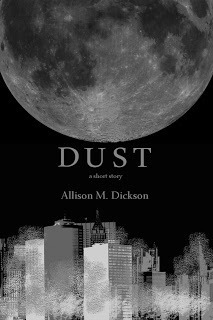
The question/comment/suggestions I've received most about one of my pieces of work involves my short story 'Dust,' a small tale about a lone survivalist who lives out a catastrophic alien apocalypse from the confines of his panic room. In dozens of reviews and emails, people have asked when or if I will ever turn the short story into a novel. They want more. They want the story to go on.
I never expected this story to touch as many people as it has. I've written a lot since that story was penned over five years ago, but nothing has really come close to generating the same response (or sales figures) as Clyde Jackson and his chilling yarn of carnivorous moon dust.
But it isn't like the readers are requesting the unthinkable. I've turned a lot of short stories into longer works. My upcoming novel, The Last Supper, began life as a novella. Also, my book Strings (also forthcoming from Hobbes End Publishing) existed first as a short story called The Good Girls (which you can buy now). Another of my shorts, The Shiva Apparatus, serves as something of a prequel to a novel I have yet to finish called The Shiva Paradox, and I've pondered on numerous occasions of expanding Under the Scotch Broom, and might actually attempt it sometime this winter.
I guess you could say turning a short work into a longer one has become something of a specialty of mine. It's like I subconsciously build my stories with some kind of special loop where, if I tug on it, it blows up like a big parachute. Also, some characters just seem to keep talking in my head long after their moments in the spotlight have passed. Like the readers, there are times when I'm just not quite ready for a story to end or where I realize I didn't fully tap the vein.
But that was never the case with Clyde Jackson. His story was never really intended to go on. 'Dust' (spoiler alert) is really the testimony of a condemned man. Also, because 'Dust' was maybe the third or fourth short story I had written, I hadn't quite learned to build that special loop into it yet. But I did as my readers asked over the years and at least tried to entertain the notion of expanding it into a novel. Try as I might, however, there just wasn't anything there.
But sometimes an idea just has to be left alone to do its thing. Sometimes it only take a few minutes or a few days or a few weeks. Sometimes it takes a few years, and then maybe a few years more. Often, the circumstances it takes to make a story bloom are about as exacting as the ones it takes to make a diamond or a perfect bottle of wine.
I don't know if this attempt I'm about to make to turn 'Dust' into a novel is going to work. But I found a way back into the story without really trying. Maybe it's because of the horrific week we've had, what with the Boston bombing and so many other tragedies that have made me want to retreat into my own little secret room and wait out the storm, but I'm ready to pull on this loop and see what happens.
Wish me luck.
Published on April 20, 2013 12:51
April 12, 2013
Body Movin'
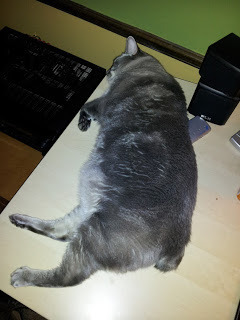
This is my buddy Angus.
We're kindred spirits.
I am a sedentary individual. And I don't just mean that my job as a writer makes me that way. It's that I have never been particularly inclined toward a very active lifestyle. I admire people with physical prowess. Although I'm not big into team sports, I absolutely love watching dancers and ice skaters and gymnasts and athletes in general work their mojo. The human body, when finely tuned, can do some pretty great things and I'm forever in awe of its resilience when you put just a little bit of work into it.
But I have just never really developed a passion for athletic activity. Oh sure, I go through bouts of it. Actually quite obsessive ones. I'll spend a summer doing regular walks and hikes (anywhere from 2-5 miles...our last two years in Washington, I was on our local bike bath every day doing up to 7 miles, kids in tow). A couple years ago, I swam at least a mile a day for several months straight (until I injured my shoulder). I have a fascination with martial arts and have a couple years' worth of kickboxing under my belt, and would love to try other disciplines. I REALLY want to do some yoga.
But regardless of my glimmers and fascinations and downright torrid affairs with various forms of exercise, my passion eventually falls short. Like feast or famine, my desire to do it is gone almost as quickly as it starts. Often because I've overdone it and hurt myself, or because the seasons changed, or because I found some new excuse to stop exercising again. Either way, I've fallen way short of making it a major priority like I have the other things in my life that I truly love, like writing and reading and cooking and movies. Like my good friend Kate Jenkins said the other day as we discussed this, it's almost as if we have to continue to "rediscover" exercise after long periods of not doing it, and it's usually when we're driven back to it because our bodies have begun to fail us again after months of neglect.
Reaching athletic goals is exciting, though. When I swam my first mile a couple years ago, I wept. My record is a mile and three-quarters. A girl my size doesn't come to expect she will be able to achieve anything in that world populated by lean, beautifully-sculpted demigods, and yet I had found something I seemed to have a natural talent for and I realized that maybe this body of mine, with all its adipose and musculoskeletal burdens, can do some pretty awesome things after all. Maybe I shouldn't sell myself SO short.
Problem is, I have let myself go pretty badly in the last year or two. I haven't gained any additional weight on the scale (have even lost a few pounds), but I'm feeling the weight I do have more than ever. This has something to do with the fact that the last eighteen months have also been the ones where I've worked the hardest at my writing/publishing. Being a full-time writer and remaining active is difficult if you don't have a natural tendency to like exercise. But I've also come to realize how necessary it is. You can't work at this job and not take care of your body, or you will become the human equivalent of slime. Your muscles will atrophy from lack of use and bad keyboard-slumping posture. Your cholesterol and blood pressure will go up. Your overall general health, both mentally and physically, will suffer greatly. Because you're not just sitting around all day. You're often sitting around all day while eating crap food and drinking way too much caffeine and possibly partaking in other vices too because so much of your mind is devoted to The Story that you can't really concentrate on much else at the moment.
And because of that, I now feel weak, like an underfed kitten (though nothing about me looks even remotely underfed). We lived in a small ranch house for nearly three years, and when we moved into this townhouse (that has a set of seventeen stairs separating the two floors) in March, climbing up to bed every night was a bit of a challenge and it still is, though it's improved greatly after the first month. I'd also hurt my knee some months ago, and that made stair climbing even more challenging, but that too has improved with regular use. I realized, though, that the quad and hamstring and calf muscles I'd had for most of my life, that had carried me up and down countless of flights with little complaint, were suddenly gone. I'd never had problems with lower body strength, but now, all of a sudden, I'm walking like I'm eighty.
Not good.
But even knowing I needed to make some dire changes to my fitness level, the idea of heading back to a gym still filled me with dread. I just don't have it in me, either mentally or physically, for Herculean efforts. And I know how I am... once I "rediscover" exercise, nothing else really gets accomplished for a few months. That includes the writing career, and I can't afford to take any kind of sabbatical right this moment, not with the book coming out and other projects in the pipeline. But I have a busy promotion schedule on the horizon, where I will likely be traveling and attending book events and having to be up and around a lot, so getting that pep back into my step is absolutely essential.
I decided, though, that I needed to do a smaller undertaking (which is not really in my "go big or go home, bitches" repertoire), with small and sustainable efforts that will hopefully add up to bigger things over time.
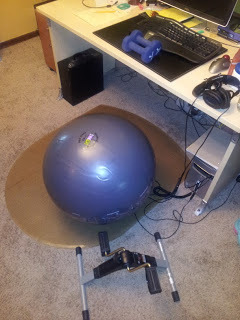
Office gym: deployed
No, I didn't invest in a treadmill or an elliptical for my office. I didn't hire a trainer or join some workout classes. But I bought a little exercise peddler and a stability ball, and I dug my 5lb free weights out of my file cabinet drawer and I've been using them every day, with the help of some YouTube workout videos.
These are tools I can use IN my office without disturbing my work routine too much. I can sit on the ball while typing and strengthen myself that way. I can take fifteen minute breaks to do some crunches and other toning exercises. I can work out my arms and work my legs with the pedals. These three pieces of equipment represent about a $60 investment. I also have a jump rope in that bottom file drawer, but that will have to wait a bit. At any rate, THIS is something I can handle right now. This will help get me where I need to be so I can take the next step. My husband and I have been trying to take regular walks, especially on the weekends, and we've been courting the idea of trying a Couch to 5K when I've got my strength back up in a couple months.
But right now, baby steps. And my legs can certainly say, without a doubt, that baby steps are a hell of a lot better than no steps at all.
Published on April 12, 2013 15:25
April 11, 2013
To All the Hand-Wringing Doomsday-Worrying Tea Leaf-Reading Publishing "Experts"
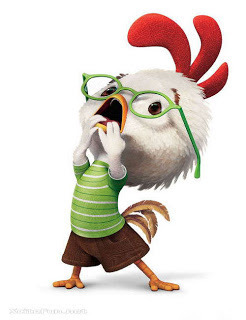
My Amazon rank is falling!!
You should be writing books.
Not sitting at your desk typing out yet another fevered missive to the author's blogosphere about how publishing is doomed, writers are being forced into poverty by Big Evil Corporations and pirates and libraries, and soon we will all stand by and watch helplessly as our livelihoods, which once afforded the likes of Patricia Cornwell to buy millions in real estate and helicopters, are reduced to a copyright-less exercise in pauperism.
Instead, you should be too busy working on your latest fictional enterprise to even give more than a passing nod to the notion that your career is going down the toilet. Because you know what else will make your career go down the toilet?
Not writing books.
I understand it's hard to make a living as a writer these days. Perhaps harder than ever in some respects. But I think people seem to be taken in by the Stephen King/James Patterson/Stephenie Meyer/JK Rowling fantasy. That if THEY have made millions, or your good writer buddy has made enough money off his self-published books that he was able to quit his day job, then certainly...
Of course, that's a nice corner of bullshit to paint yourself into. It's like any other industry out there. You have the gods at the top, while the rest of us spend a lifetime shoveling our shit in the shadows, known only to a few generous souls who are willing to kick a quarter to us for our efforts from time to time. I'm sure that very talented saxophone player down in the subway who plays to people who treat him like so much window dressing they pass by on their way to their cubicles every day (while dropping their spare pocket change into his open instrument case), or the guy who sets up his easel and a couple chairs near a city farmer's market with a sign that says Your Caricature Here, $10, don't spend much time worry-warting about the status of their chosen art forms every five minutes. They're too busy doing what they love and trying to stay alive in the process.
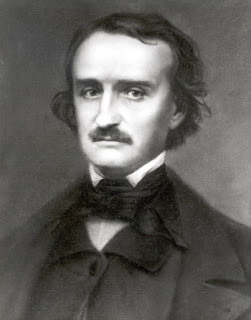
Poe is getting real tired of your shit
Lest you forget, you chose to be an artist, and artists are traditionally quite poor, or they will never make enough money strictly from their art to support themselves. You know that guy Mozart? He was buried in an unmarked grave, and at the time of his death was not particularly regarded as the genius we call him today. Charles Dickens made decent money, but he also had a wife and ten kids to feed. And a mistress to support. Vincent Van Gogh took his own life, penniless. Edgar Allan Poe was probably the most quintessential starving artist of his time, having not made a dime off most of his work. And Oscar Wilde, a flamboyant man who lived mainly off of the generosity of his friends and lovers, has been famously quoted as saying that he would die as he lived, beyond his means.
So you know what? All this stuff you're reading about, all this apocalyptic "the age of the author is dead" claptrap from Scott Turow and others, is a complete waste of time. The sky is not falling, at least not anymore than it has been. If you're banking on your monumental talent as an entertainer making you rich, or even making you enough money to not need income from other sources... well, that's your first problem. You shouldn't be banking on anything other than churning out the best work you possibly can and then marketing the living shit out of it. And if the money should follow, hooray for you.
Riches... or even appreciation or plain old recognition are rare in this business and always have been. If you're lucky enough to have made enough royalties from your work to sustain your lifestyle, good for you. Be grateful and keep doing whatever you're doing. If you're not one of those lucky few, keep working. Because as tempting as it is to gaze into the crystal ball and divine The Future of Publishing (or movie making or music or painting or interpretive dance) and find reasons outside yourself for why your work isn't selling, the only thing it really does is take you away from what you should be doing: writing.
Published on April 11, 2013 06:09
April 5, 2013
When Writers Die: My Tribute to Roger Ebert
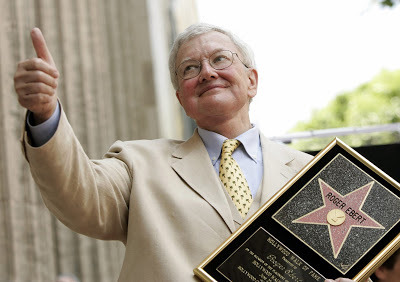
One of my personal heroes died yesterday. I'm still prone to weeping when I think about it, and I doubt I'll get through this with dry eyes. And rather than judge myself as silly or weird for feeling this way, I will instead do what I do best. I'll try to express why this hurts so damn bad.
I remember being nine or ten years old and watching Siskel & Ebert on television, like millions of others. But it was when I realized one day, while scouring our local newspaper for the funny pages, that Ebert's reviews were syndicated in the Oakland Press that I became a reader of his, and that was when I became a fan for life. Eventually, I would race for the Friday Ebert reviews in the Lifestyle section before I went to the comics. When I was old enough to go to the movies alone and pay for my own tickets, it was Ebert's reviews that rode along in the back of my head, guiding my movie purchases. I would then look for the things he mentioned in his reviews, and it was his words, along with the wisdom I eventually gleaned from several film classes through high school and college, that kindled in me a love for film and film-making that has endured to this day. It was because of him that I felt inspired to review movies on my blog. Even when I didn't agree with Ebert's assessment, I was grateful for his viewpoint, and I think the man was also grateful for any opposing banter that came his way, if anything because it opened the floor to discussion about the thing he loved the most. I'm sure Gene Siskel would have agreed. Ebert taught me that it's okay to disagree with the people you love. He's still teaching me that.
The day Ebert responded to one of my emails, a brief missive about the ending of the special edition of The Exorcist, was one of the greatest days of my life, ranked right up there with getting a response to the letter I wrote Stephen King, my other personal hero. It's nice touching base with the people who have enriched your life, even if it's just a passing glance.
I followed his writings from newspaper onto the internet, where up until the day he died, I was a regular visitor (I can't be right now, because unsurprisingly, the site is down). When he started blogging about issues of politics, religion, science, and life in general after his illness took his speech, I became an even bigger admirer and I realized we were kindred spirits. I imagine we would have been fantastic friends.
The thing is, Roger Ebert was my friend, even if he didn't know it. And now that I've read that so many times from so many people in the waning hours since the terrible and sudden news of his passing, I know I'm not alone.
When writers die--whether they write blogs, film reviews, novels, movies, or music--it hurts in much the same way it hurts when a friend dies, because their words became a part of our own personal narrative. They insert themselves into our brain waves and harmonize with our own voices. The act of reading their work is akin to checking in on them and seeing how they're doing. Their writings keep us company when we're feeling lonely. They keep us warm when we're feeling a spiritual chill. As readers, we have a privilege to look into someone's soul just a little bit. And our brains, fooled they may be, believe on an emotional level that this person is a close relation to us. When their voices go forever silent, the grief is immediate. No more will I get to see a movie and then check in with my "friend" Rog and see what he thought of it. No more will I get to have a conversation with him in my mind about what I disagreed or agreed about with a particular film, and then carry that conversation to one of my actual friends, where all our views will co-mingle into this mind-opening intellectual soup of awesomeness.
The truth is, I'm crushed. When writers die, the world loses a unique frequency. Some voices may come close to matching it, but it will never be the same. I imagine when Stephen King dies, I'll be locked into my room for a week.
But there is a silver lining to all of this. When writers die, they also leave so much of themselves behind, an invaluable treasure trove of words to be read and re-read again and again. And when you do read those words, you realize you can still hear the person who wrote them, and for briefest moment your traitor brain allows you to believe they're still here, and that everything feels as it should.
Published on April 05, 2013 06:19
April 3, 2013
How to Forge a Story, Tarot-Style: A Review of Story Forge Cards
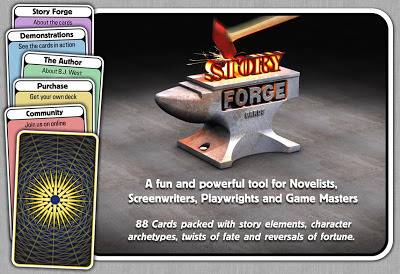
I'm going to show you how a story is born.
People ask where my ideas come from all the time. I even answered that question over at The Author Spot just recently, so you should check that out. But before you get sidetracked by that awesome tangent, I want you to stick with me for a few minutes and watch a miracle unfold. Then I want you to get out your credit card or your PayPal address, because you're gonna need it. I have absolutely zero vested interest in promoting any product for any company or individual, but I will happily evangelize for people who are doing amazing things that make life awesome in the creative world. One such person is B.J. West, creator of Story Forge Cards and the highly successful Kickstarter campaign that made it possible for me to buy them.
My fellow Creative Commoners podcast host, Corey Bishop, discovered these cards back when we did a show about Kickstarter (he actually contributed to the campaign while on the air), and we later had B.J. West on the show (listen to Part 1 and Part 2), as well as actually used the deck on two other episodes. One you can listen to here, and the other one will be airing in a couple weeks. We're enthusiastic enough about the product that we will likely have recurring episodes where we use the deck and encourage listeners out there to submit their own success stories with them.
You may be asking if you actually need a deck of cards to help you come up with story or character ideas. I mean, maybe you're the kind of person who likes your ideas to come straight from the wild and ferment into delicious stories, like old-time sourdough left out in the open air to collect yeast over time, as opposed to more modern methods that use a pre-engineered starter of some kind. Maybe you're like me and you absolutely abhor outlines or any other "device" designed to force the creative beast that lives in your soul into a box.
Well, I can't blame you for feeling that way. I'm an idea purist, and when I first saw these cards, I too was convinced it was a gimmick for people who couldn't use their imaginations unless they had a crutch. At best, I thought they would be a fun little novelty, like Mad Libs. At the worst, I was concerned that any story that came from these cards would be stilted and contrived and all too formulaic. My inner-curmudgeon was in full "get off my lawn" mode, and I'm sure yours is right now as well, but I urge you to just wait.
It wasn't until we taped the first Story Forge episode on Creative Commoners and actually used the things that I realized how all those assumptions were wrong. In fact, the cards were the opposite of constricting. The purely genius design of Story Forge is how very open it is. B.J. West is no stranger to storytelling or the creative process. The only thing he's encouraged the user to do here is to think their way to a story that's all their own. Ever feel like you are having trouble breaking through a wall and coming up with a new idea? These cards are like an enchanted war hammer.
But it's not enough for me to just write about how awesome they are. I went ahead and did a sample layout for you and will post the pictures here so you can see what the process looks like. If you want more of an idea that you can listen to or watch, visit the links I posted above for the podcasts or go to the Story Forge site, where there are plenty of demonstrations. But my hope is, by the time you finish reading this here blog, you'll want to go over there and buy your very own deck and try this for yourself. It's nothing short of exhilarating.
So let's get started.
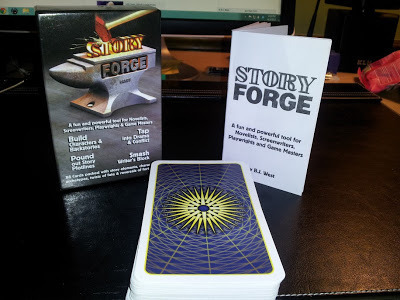
Here are the contents of the Story Forge box. The cards are not small. Think Tarot again. They're the size of a 3x5 index card. I like this aspect of them. They feel substantial. Powerful. And the deeper you get into a story or character background layout, the more powerful the cards actually start to feel. But I'll get into that in a minute. The little booklet is simple and well-written, and it provides a wealth of layout diagrams, from the classic hero's journey to film noir, to character backgrounds and action story. But don't feel hemmed in by the diagrams or even the cards themselves. Each "suit" (destiny, wealth, will, emotion, identity) comes with two blank cards so you can make your own.
For the purposes of this blog, I chose the Once Upon a Time layout, which is pretty quick and simple, and (I think) a good way to get a basic idea off the ground. I have done this one a few times now and I think it's very well suited to short stories. But here's what it looks like:
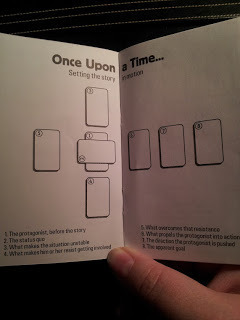
Now, the text below the diagram is something I have to admit I don't pay TOO close attention to. I mean, certainly factor it in if you really want to understand the elements of classical story structure. But if you feel like that's putting baby in a corner, then disregard for now. To me, I think just the act of turning the cards and placing them is really what gets the juices flowing and makes this experience special. More on that later.
So I shuffled the deck really really well, cut it, and got started. Here's card #1 (feel free to play along):
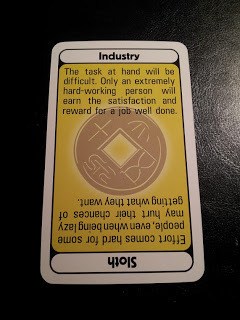
Notice how the card has two options on it. The one on the other side is the polar opposite. Now, you wouldn't be breaking any rules if you flipped the card over and used the other option instead of the one you turned up originally. If the Sloth side works better for your story than Industry, by all means. That's the beauty of this. Options. Anything it takes to pry open your mind and let the creative juices out.
So, the first card is always intimidating. I've found that the best way to get rolling with something like this is to already have a kernel of an idea in mind in terms of what you're looking to write. Say you came up with something awhile back but it just felt dead in the water or didn't have any real meat on its bones. For me, in this case, I had wanted to write a story about a geocaching expedition gone very much awry, but I had absolutely no inkling of how to handle the plot.
With this card, I basically interpreted it as a very ardent hiker and geocaching enthusiast who is on a mission to find every last hidden cache in her state... only at some point, it became more like an obsession (backstory: her husband and daughter were killed tragically, and this has become something of a soul-searching expedition for her...something I pondered when I was thinking about the character and what might be driving her on this task).
Next card:
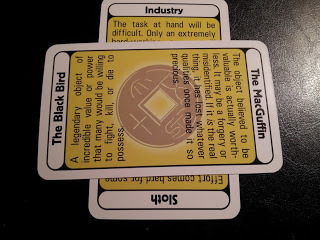
The Black Bird. Now, keep in mind that these cards are drawn randomly and I'd already had an idea this story was going to be supernatural/artifact-driven. This isn't and will not be the first time things like this happen with these cards (alluding to how they almost feel mystical in the way they give you direction, or seem to know where you're already heading).
In terms of the story, I wrote down in my notes that naturally she's starting to find a pattern of notes/objects/artifacts in these caches that's leading her somewhere. These are things I would usually plan to work out once I started actually writing. Next card:
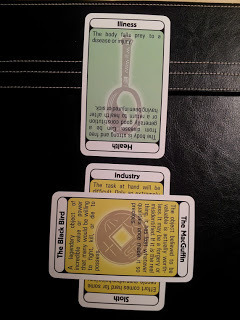
Illness. Okay, so she's growing closer to something happening. I wrote in my notes that perhaps she's maybe opening a door of some kind, and the closer she gets to doing so, the more of a physical effect it's having on her. Perhaps it's making her sick. Again, a detail I can fit in or work out in the course of the actual writing. Next:
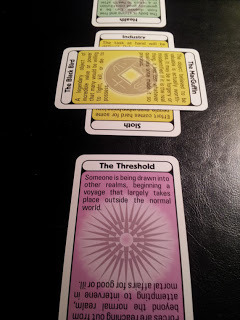
Again, this was a COMPLETELY RANDOM DRAWING. It's at this point, I started to feel my mind tingling. Something was happening here. My brain and the creative wellspring from which I draw so many of my story ideas were basically feeding off one another like mad. Doors were opening, and I don't just mean in my burgeoning story plot. I was writing down notes so quickly I doubt I'll be able to read it all later, but the thing is, I don't think I'll need to read it all, because the moment left a very deep impression in my memory, the way most of my story ideas do (which is why I have typically eschewed notes as anything other than reinforcement devices).
Next:
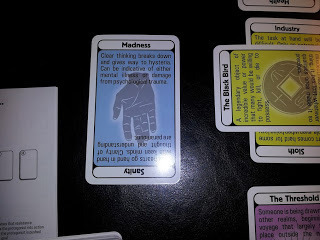
Madness. So I started thinking, while on the other side of this door, in this other realm, she finds her family intact. First she's frightened, then fascinated... but then she starts to believe that this alternate family is truly hers, and that the alternate version of herself is actually the invader. Now, this is treading in Fringe territory, and I don't believe I would wind up writing it this way exactly, but this is all about making a general sketch. Details are subject to change, and that's perfectly okay. The important thing is that the part of the brain that spits out ideas was working.
Next:
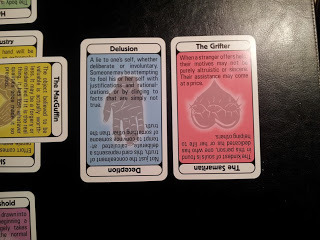
These cards represent two separate draws, but I just decided to condense them into the same picture. The first is Delusion. And again, this is perfect and fits in with her madness scenario. She's losing her grip, she's deluding herself into believing things that aren't true (that this other family is actually hers) and I think it's driving her to make a decision she could come to regret.
Then comes the Grifter card. And this one was a real challenge. Obviously I would have to introduce a character who would try to initiate some sense into this woman, but what exactly does he get out of it? What is his role in this whole thing? Did he place these objects that led to her opening the door and thereby set some sort of trap? Something to ponder.
And finally:
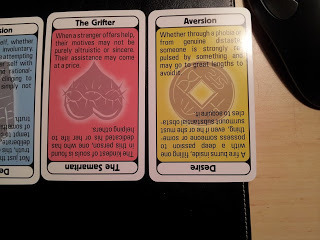
The Aversion card was also interesting. It could refer to any of the characters I've established, but ultimately what came to mind was that the main character gets the opportunity to stay in this world she stole for herself (and at what great cost), only to find... the family she hoped to have back no longer wants anything to do with her, thereby wrapping it up in classic Allison fashion.
Here's the whole thing from up above. Isn't it a beauty? To me, the formation has power. There is not just one idea in there, but INFINITE ideas. I could come back to this very same layout tomorrow and have a whole new story idea. It might not be a bad idea to take pictures or write down certain compelling layouts so you can refer to them later.
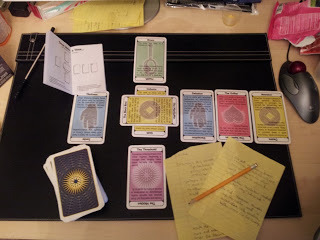
Now, you will notice that these cards did not give me any answers at all. I provided them for myself. The deck is really nothing more than a series of guideposts that will hopefully lead you to a great idea to work from. You might have looked at these cards and saw a completely different plot, and that's why these cards are so amazing. I would love to know what you might have come up with.
Now, it doesn't end there. Like I said, Once Upon a Time is a pretty simple layout. But I decided to step it up a notch and do the Hero's Journey next. I'm not going to reveal all those cards here, but I will show you what the diagram looks like for comparison:
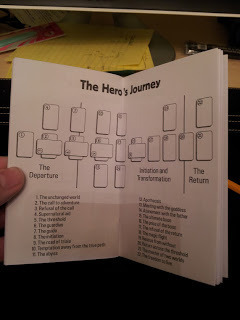
And an hour later, I had this:
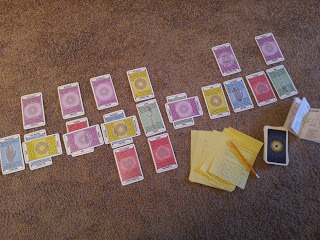
What you see there is quite possibly my next novel. Or its skeleton anyway. Next, I plan to do several character background layouts to get a true sense of the people who are going to populate this book.
This layout was my favorite so far. With every turn of the cards, I grew more excited and apprehensive. It was (and pardon my enthusiastic mysticism here) almost like waiting to see what the universe was going to throw at me. And similar to the above layout, where it seemed oddly serendipitous, I had many of those moments with this one too. Such that the last and second to last cards I turned were the ending I already had in mind before I was even halfway through the layout. I was covered in goosebumps. It was a spiritual thing.
I have suggested to B.J. West that something like this really would lend itself well to a mobile app, but there is something about handling these cards that adds to the experience. And it's hard to describe what. I feel almost like something would be lost if I were flipping these cards on a computer.
At any rate, hope I've convinced all you storytellers out there--whether you're writing novels, short stories, movies, comic books, or play tabletop games--to pick up a deck of these cards. You can even use it as a party game. Teachers could use them as a classroom aid. The possibilities really are endless. I was a token doubter. Now I'm a rabid convert. When I think of all the things I can dream up with the help of these cards, I become a little giddy.
Published on April 03, 2013 22:57
March 26, 2013
I Wish I Was Better
I've become a lot of things as I've grown older, but I like to think I've become more temperate, less inclined to make snap judgment about people and things, less likely to be just plain mean. I no longer see meanness as a reflexive way of dealing with all the moments in my life that I've felt robbed of power and importance, or like I was drowning in someone else's shadow. I no longer need that sickly satisfying jolt of acid in my blood to make me feel substantial. In those moments where I feel like I might need a fix of that old drug, I find it's much easier to remain quiet and let the moment pass.
I have my temperate husband to remind me of this on a daily basis. But I also have my kids, and I have my job. Writing has taught me the infinite power of words to build up and tear down, to elate and defeat. They should be used wisely, words.
But I guess all this newfound calmness has a limit, because I feel a lot of anger still toward people who haven't yet learned these lessons, who haven't attained this temperance, who haven't learned to stop being so goddamn mean. And I'm not talking about using situational irreverence or irony or well-timed comedy to get a laugh. I'm talking about intentionally setting out to deprive people of happiness. Of marginalizing and squashing and crushing and bullying and obliterating their hopes by saying no, you're not like us. You can't have what we have.
Of denying people love.
What kind of miserable person do you have to be to stand in the way of love? How deprived of love must you have been in your life to bring so many people down and make something so ugly out of something that's supposed to be so beautiful?
I can't even imagine. I try to recall the anxiety-induced, rage-driven moments of my life where I've hurt someone specifically to make myself feel better--and forget the remorse I felt afterward--just that one moment where I felt so powerless and dejected and scared that the only available recourse was to suck someone else's happiness away and make them feel every bit as small as I did. And I think it pales in comparison to what these hateful people must be living day after day. They've become so used to feeling this way that they've rationalized it, have built their careers around it, have built their entire world views around feeling big at the expense of making others feel small.
And I hate these people. I don't want to hate them, but I do. I want to be able to open up my heart to them in order to give them the love they were so obviously denied, so that they might stop denying it of others. But I can't. I can't, because so many of these people are learned. They're intelligent. More intelligent than me, in some cases. They can solve complex equations and crossword puzzles. They can read complicated books and comprehend them. They even became Presidents and Supreme Court Justices.
THEY SHOULD KNOW BETTER.
Just like I knew better.
If they can know so much, but can't figure out how not to empower themselves at the expense of others, then why should I give them any of my time and compassion when so many others who have been damaged by these people will be grateful for it?
See, I know I should be better than this. I should look to my Dalai Lama, to Jesus Christ and all those other idealistic souls who implore us to love our enemies. To turn the other cheek. To realize that the world will never really get better until we've learned to bestow love on those who hurt others. Because why else would they be hurting others if they themselves weren't also hurting?
But I haven't gotten there yet. Maybe that's the last and final step to inner peace.
It will come someday. I will be a better person.
I have my temperate husband to remind me of this on a daily basis. But I also have my kids, and I have my job. Writing has taught me the infinite power of words to build up and tear down, to elate and defeat. They should be used wisely, words.
But I guess all this newfound calmness has a limit, because I feel a lot of anger still toward people who haven't yet learned these lessons, who haven't attained this temperance, who haven't learned to stop being so goddamn mean. And I'm not talking about using situational irreverence or irony or well-timed comedy to get a laugh. I'm talking about intentionally setting out to deprive people of happiness. Of marginalizing and squashing and crushing and bullying and obliterating their hopes by saying no, you're not like us. You can't have what we have.
Of denying people love.
What kind of miserable person do you have to be to stand in the way of love? How deprived of love must you have been in your life to bring so many people down and make something so ugly out of something that's supposed to be so beautiful?
I can't even imagine. I try to recall the anxiety-induced, rage-driven moments of my life where I've hurt someone specifically to make myself feel better--and forget the remorse I felt afterward--just that one moment where I felt so powerless and dejected and scared that the only available recourse was to suck someone else's happiness away and make them feel every bit as small as I did. And I think it pales in comparison to what these hateful people must be living day after day. They've become so used to feeling this way that they've rationalized it, have built their careers around it, have built their entire world views around feeling big at the expense of making others feel small.
And I hate these people. I don't want to hate them, but I do. I want to be able to open up my heart to them in order to give them the love they were so obviously denied, so that they might stop denying it of others. But I can't. I can't, because so many of these people are learned. They're intelligent. More intelligent than me, in some cases. They can solve complex equations and crossword puzzles. They can read complicated books and comprehend them. They even became Presidents and Supreme Court Justices.
THEY SHOULD KNOW BETTER.
Just like I knew better.
If they can know so much, but can't figure out how not to empower themselves at the expense of others, then why should I give them any of my time and compassion when so many others who have been damaged by these people will be grateful for it?
See, I know I should be better than this. I should look to my Dalai Lama, to Jesus Christ and all those other idealistic souls who implore us to love our enemies. To turn the other cheek. To realize that the world will never really get better until we've learned to bestow love on those who hurt others. Because why else would they be hurting others if they themselves weren't also hurting?
But I haven't gotten there yet. Maybe that's the last and final step to inner peace.
It will come someday. I will be a better person.
Published on March 26, 2013 07:13
March 23, 2013
Don't Wait. Work. Or Why Patience in Publishing is Necessary.
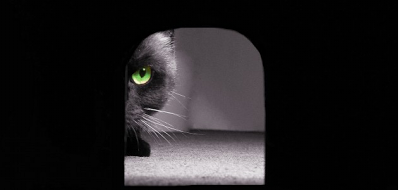
I'm not the most patient person around. Ask my husband or anyone who knows me. I hate waiting in lines. Congested traffic drives me bonkers. Slow internet connections make me want to kick things. So working in the publishing industry doesn't seem like a natural fit for me, does it?
I've said it before and I'll say it again, but publishing is sloooowwww. It's slower than slow. It's inject a tortoise with valium slow. There is no such thing as a quick buck. That first ebook you just put up on the Kindle store? Depending on your royalty percentage, it may not earn you enough money to buy even a Happy Meal for weeks. That short story you just submitted to that mid-level magazine or anthology? You might get paid on acceptance, but sometimes they pay on publication, which could take anywhere from a few months to a year. That is if you get paid at all. Professional markets are much better and pay a lot more, but competition is steep to impossible. Getting into one is like hitting the lottery.
OR (and this is common), you may not even get a response to your submission at all--the short story market is the cruelest of all mistresses, but slush-fatiged agents and publishers are also fast joining the "no response means no" brigade. As a writer, you will spend an interminable amount of time in submission limbo.
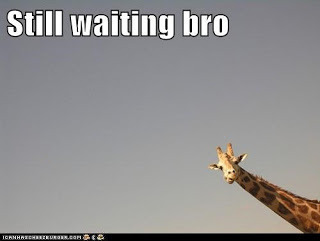
So what about that novel you spent a year or more perfecting that you just convinced an agent to sign? It could be months before he or she sells it to a publisher, if he or she even sells it all. And if they (or you, sans agent) do manage to sell it to a small press or major publisher? You may get an advance, or you may not (advances are shrinking faster than Barnes & Noble's bottom line). And then, after your little celebratory dinner following the signing of your contract, it will take a year or more to get the book out on the market, and when it actually DOES start to sell? You likely won't start seeing royalties for at least three months. And if you have an agent, he or she will take his or her 15% before you get yours. Oh yeah, and the retailers and the publisher and the distributors will also get their cut. And don't forget about Uncle Sam (which you have to deduct and account for yourself, because there ain't no payroll department who's going to withhold taxes for you). So that check will probably be smaller than you expected.
And after that, you might get regular checks monthly, quarterly, or even bi-yearly depending on your contract. Authors, even highly-regarded bestselling authors, will never draw a weekly or bi-weekly paycheck like a regular 9-5 worker.
So it would seem that I should have run from this business like my hair was on fire. But if anything, I've only embedded myself deeper, more and more determined to squeeze pennies from rocks, just to make it work.
Why?
Because I didn't do this to get rich (though that would be nice). I don't do this for the money (though money is always welcome, and I'm proud of every little cent I've made so far). I do it because I fucking love doing it, and because I believe that eventually I will get to a place where all of the hard word, all of the seeds I've sown for the last five years, will sprout something pretty awesome that will benefit us all. If I didn't believe that, then I might have stopped doing this. But having a deep understanding of how publishing works, and knowing that everything is happening as it should, has helped keep my patience in check. This is why any of you who are feeling a little huffy, a little discouraged, a little confused by this whole thing NEED to do your research and get to know this industry like the back of your hand. Impatience is difference between reality and the level of your expectations. The less you understand things, the less patient you will be. Fix that little equation, and the whole thing will become a hell of a lot easier to handle.
I also feel inured from my typical impatience, because I'm not actually "waiting" for anything. I'm working. Being a writer is like having an infinite stove with infinite burners. Something is always in various stages of the cooking process while I'm prepping the next "dish." If I was waiting for something to happen, I would have become discouraged a long time ago.
In publishing, you can never think of what's happening "now." You have to keep looking ahead. You can't make just one little effort and think it's enough. You can't even make one huge, Herculean effort and think it's enough. You might have bled yourself dry on that one thing, but if you think that's all it takes, you might as well pick another line of work, because this isn't the field you turn to where one book, one story, one lone little Kindle download with your name on it is going to earn you dividends you think you're entitled to. Sure, we like to look longingly at those literary legends who wrote one book then fed the next several generations of family on the royalties (Harper Lee). But almost no one will ever be that person. The rest of us will have to sit down at that keyboard and open our wrists again and again and again...and again for even a modicum of that fame and fortune.
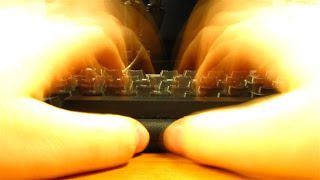
So just remember... if you're feeling discouraged or impatient or like this whole writing thing isn't paying off for you... get back to work. Writers who climb the ranks to make a decent living are many things. They're talented, they're resourceful, they're innovative and driven. But above all, they're busy .
Published on March 23, 2013 09:41
March 21, 2013
Update: Phantasmic Flashes, The Last Supper, Strings, and Office Space
It's been a while since I last blogged, and a lot has happened since then, which means it's time for another episode of ALLISON'S UPDATE-PALOOZA!
Yeah, that is now a thing. Now on to the updates! So much to share.
1. New Ebook on Amazon!
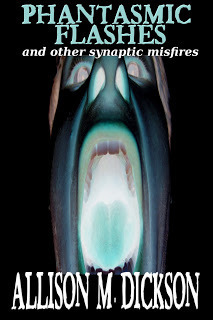
I've been on a mission this year to get out one new short story a month. February was a colossal failure (for reasons I will explain in a bit), but March was a success. This month's new release isn't just one story, though. It's several all in one! What do you do when you have four chapters of a failed novel concept and several flash fiction pieces you wrote for your podcast just lying around on your hard drive? Why, you assemble a collection, of course. "Phantasmic Flashes (and other synaptic misfires)" is a compilation of short bursts of weirdness punctuated by the surreal and the bizarre. It's probably the most artistically risky thing I've put together, because it isn't completely linear. I thought it would be neat to break up the novel chapters and place them in between the other stories like weird little interludes. Or... maybe the flash fiction stories are the interludes. That's up to YOU to decide!
It's only a buck-ninety-nine on Amazon, so do give it a try, won't you? I'm actually quite proud of the thing and would love to know what you think.
Stay tuned until next month, when I drop a new story on you lovely people about a strange little wedding chapel out in the desert...
2. THE LAST SUPPER is Almost Ready to Serve!
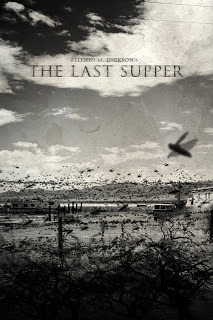
Since January, preparations at Hobbes End for The Last Supper have been hot under way. I'm about to complete the fourth draft, and it shouldn't be more than another read-through or two before it's ready for layout. The cover concept (by my super amazingly talented graphic designer brother, Brandon L. Cox) is looking great as well, as you can see here. It will look a bit different when the book is released, but this will at least give you a taste of what you can expect. No firm release date just yet, but as soon as I know, you will know. All of the jitters I was feeling earlier in the process have been smoothed out as I've had a chance to get in there and do some rewrites and really get the book how I want it to be, and I'm so very thankful for the amount of creative control that Hobbes End has given me, and we are all super excited to unleash this bad boy on the world.
In the meantime, I've been putting some thought into the big release event, which I hope will be a heavily attended celebration where people will be able to come, meet with me, get some swag, check out the book (I'll be happy to sign any and all copies, and I'll have some for sale), and eat some book release-appropriate food (e.g. CAKE), and maybe hear a (likely alcohol-fueled) reading from yours truly. You really won't want to miss this.
3. I'll Be Pulling Your STRINGS Again Soon!
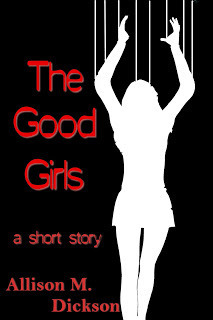
And as if the folks at Hobbes End aren't busy enough, they just sent me the official contract for my next book, STRINGS, which I happily signed and mailed back to them. The deal has been in the works for several months, but now that it's officially been inked, feels very real to me now. To reiterate for those who missed it before, this is the full-length novel version of my short story, "The Good Girls," which people have described with such adjectives as "amazing," "terrifying," "nightmarish," "soul-sucking," "man-hating," and "hopeless!" If' you're into those things and more (incest! torture! murder! revenge!), you will probably dig this book. Truth be told, I'm more excited about this than anything else I have on the slate at the moment. Okay, except maybe Colt Coltrane, but I haven't gotten a publishing deal for that one yet (final rewrite on that one is pending). Narratively, each character story (or "string") could stand on its own, but they are inexorably entangled, struggling to break free.
I imagine it will probably be sometime in 2014 when that one comes out, but given that we're nearly into April as of this writing, I don't think it's going to be too long to wait. Oh, I also have a planned trilogy for this. So if this book does well, expect to see more!
4. Promotional Photos! I Have Them!



Last weekend, my friend KimberlyJade of KimberlyJade Photography, took a bunch of pictures of me. Some of them turned out pretty nice. One of them will be featured on The Last Supper cover, and others will be used all over the interwebs for promotional stuff. The shoot wasn't quite as terrifying as I thought it would be. I hate having my picture taken. I really really do. But I got through it. Recently reflected with some friends on Facebook about the differences between taking your own pictures for casual use things (like Facebook), and having someone else take your photos in a staged shoot like this. The pictures that Kim took of me are probably a closer representation of how other people see me (for better or worse, and if I'm being truthful, it's worse right now, but I'm coming around). The pictures I take of myself are carefully controlled shots of how I want others to see me (but are, for better or worse, not quite as accurate a representation). Ah, welcome to the world of the self-hating female brain, where you will see only your glaring flaws, even when people are fawning over how awesome your pictures look. I'm realizing there is a lot I really don't like about my face, that can only be erased by certain angles and filters that other people just aren't aware of. It's the same reason that no one else can put on your socks or brush your teeth for you without it just feeling strange and foreign. They just don't have your muscle memory. They just don't know how you do those things you do that make you feel..."right." But that's only my own insecuritity at work. It's a process of self-acceptance I will probably always have to go through. Thankfully, though, the more I look at these pictures, the more accepting I feel of them. They are me. For better or worse.
5. I've Moved!
And finally, let's talk about why February was such a terrible month, and why I didn't get out a story, and why three weeks into March, I'm still feeling the ripple effects. Sometime around the second week of February (when I was in the midst of a full-time day job and stupid winter...) our now-former landlord knocked on our door and informed us he wanted his house back. Life Lesson #1: just because you hope someone isn't going to be a complete dick and exercise their contractual right to push you out of your house in the middle of winter (and the school year) doesn't mean that person isn't going to be a dick and do just that. In fact, always assume the person in question is just a dick, and prepare accordingly.

Anyway, moving, dealing with the kids' school, AND a full-time job meant suddenly my rather simple, quiet, and routine life had just turned into Alderaan. I eventually had to leave my job...well, I had to leave my job for more reasons than just the move (and is another reason why February was utterly horrible), but that's another saga I don't plan to get into here...and I got set about house hunting and packing and doing all the things I really hate doing (putting belongs into boxes). There was about a two-week period, that gray area where you don't know where you're going to be living a month from now, where I thought the only way I would be able to get through it is if I was heavily medicated. There just wasn't a lot for rent this time of year in our price range, and certainly nothing in the kids' current school district, which meant another school switch, mid-year no less, was imminent (and that was most upsetting of all and one reason why, if my "I'm sorry, but I can't wait until May or June" landlord appeared right now on my porch steps, I would happily kick him in the teeth).
But find a place we did. It's bigger, it's not all that much more than we were paying for the piece of crap brick box we were living in. It has a great kitchen (and a dishwasher!!), a utility room that isn't in the kitchen, a two-car garage, a great neighborhood, and since it is technically a condo, it means we don't have to worry about lawn maintenance (something neither Ken nor I will miss too terribly for the time being). I couldn't be happier. Also, I now have an office!
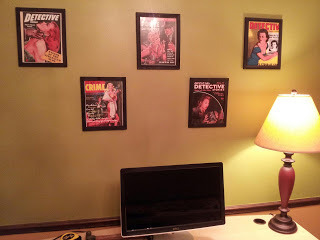
It was once a formal dining room, but who the hell uses formal dining rooms for their intended purpose anymore? We painted it to our liking and are now filling it with all manner of pulpy inspirational decor. Best of all, the home theater has been relocated to our (huge) master bedroom, which means the whole lower level of the house is now a quiet, serene space suitable for writing and reading and recording podcasts, and gaming! Oh, and there are bookshelves!
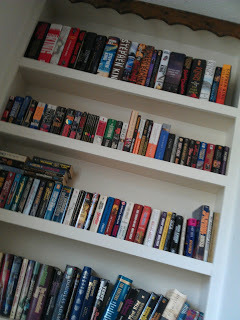
I've been more productive over the last two days than I have in the last year. So yeah, I love it here. Sometimes being forced to move by a dick landlord is the best thing that can happen to you. I look forward to seeing what creations happen here over the next (hopefully several, as in 5-7) years.
Yeah, that is now a thing. Now on to the updates! So much to share.
1. New Ebook on Amazon!

I've been on a mission this year to get out one new short story a month. February was a colossal failure (for reasons I will explain in a bit), but March was a success. This month's new release isn't just one story, though. It's several all in one! What do you do when you have four chapters of a failed novel concept and several flash fiction pieces you wrote for your podcast just lying around on your hard drive? Why, you assemble a collection, of course. "Phantasmic Flashes (and other synaptic misfires)" is a compilation of short bursts of weirdness punctuated by the surreal and the bizarre. It's probably the most artistically risky thing I've put together, because it isn't completely linear. I thought it would be neat to break up the novel chapters and place them in between the other stories like weird little interludes. Or... maybe the flash fiction stories are the interludes. That's up to YOU to decide!
It's only a buck-ninety-nine on Amazon, so do give it a try, won't you? I'm actually quite proud of the thing and would love to know what you think.
Stay tuned until next month, when I drop a new story on you lovely people about a strange little wedding chapel out in the desert...
2. THE LAST SUPPER is Almost Ready to Serve!

Since January, preparations at Hobbes End for The Last Supper have been hot under way. I'm about to complete the fourth draft, and it shouldn't be more than another read-through or two before it's ready for layout. The cover concept (by my super amazingly talented graphic designer brother, Brandon L. Cox) is looking great as well, as you can see here. It will look a bit different when the book is released, but this will at least give you a taste of what you can expect. No firm release date just yet, but as soon as I know, you will know. All of the jitters I was feeling earlier in the process have been smoothed out as I've had a chance to get in there and do some rewrites and really get the book how I want it to be, and I'm so very thankful for the amount of creative control that Hobbes End has given me, and we are all super excited to unleash this bad boy on the world.
In the meantime, I've been putting some thought into the big release event, which I hope will be a heavily attended celebration where people will be able to come, meet with me, get some swag, check out the book (I'll be happy to sign any and all copies, and I'll have some for sale), and eat some book release-appropriate food (e.g. CAKE), and maybe hear a (likely alcohol-fueled) reading from yours truly. You really won't want to miss this.
3. I'll Be Pulling Your STRINGS Again Soon!

And as if the folks at Hobbes End aren't busy enough, they just sent me the official contract for my next book, STRINGS, which I happily signed and mailed back to them. The deal has been in the works for several months, but now that it's officially been inked, feels very real to me now. To reiterate for those who missed it before, this is the full-length novel version of my short story, "The Good Girls," which people have described with such adjectives as "amazing," "terrifying," "nightmarish," "soul-sucking," "man-hating," and "hopeless!" If' you're into those things and more (incest! torture! murder! revenge!), you will probably dig this book. Truth be told, I'm more excited about this than anything else I have on the slate at the moment. Okay, except maybe Colt Coltrane, but I haven't gotten a publishing deal for that one yet (final rewrite on that one is pending). Narratively, each character story (or "string") could stand on its own, but they are inexorably entangled, struggling to break free.
I imagine it will probably be sometime in 2014 when that one comes out, but given that we're nearly into April as of this writing, I don't think it's going to be too long to wait. Oh, I also have a planned trilogy for this. So if this book does well, expect to see more!
4. Promotional Photos! I Have Them!



Last weekend, my friend KimberlyJade of KimberlyJade Photography, took a bunch of pictures of me. Some of them turned out pretty nice. One of them will be featured on The Last Supper cover, and others will be used all over the interwebs for promotional stuff. The shoot wasn't quite as terrifying as I thought it would be. I hate having my picture taken. I really really do. But I got through it. Recently reflected with some friends on Facebook about the differences between taking your own pictures for casual use things (like Facebook), and having someone else take your photos in a staged shoot like this. The pictures that Kim took of me are probably a closer representation of how other people see me (for better or worse, and if I'm being truthful, it's worse right now, but I'm coming around). The pictures I take of myself are carefully controlled shots of how I want others to see me (but are, for better or worse, not quite as accurate a representation). Ah, welcome to the world of the self-hating female brain, where you will see only your glaring flaws, even when people are fawning over how awesome your pictures look. I'm realizing there is a lot I really don't like about my face, that can only be erased by certain angles and filters that other people just aren't aware of. It's the same reason that no one else can put on your socks or brush your teeth for you without it just feeling strange and foreign. They just don't have your muscle memory. They just don't know how you do those things you do that make you feel..."right." But that's only my own insecuritity at work. It's a process of self-acceptance I will probably always have to go through. Thankfully, though, the more I look at these pictures, the more accepting I feel of them. They are me. For better or worse.
5. I've Moved!
And finally, let's talk about why February was such a terrible month, and why I didn't get out a story, and why three weeks into March, I'm still feeling the ripple effects. Sometime around the second week of February (when I was in the midst of a full-time day job and stupid winter...) our now-former landlord knocked on our door and informed us he wanted his house back. Life Lesson #1: just because you hope someone isn't going to be a complete dick and exercise their contractual right to push you out of your house in the middle of winter (and the school year) doesn't mean that person isn't going to be a dick and do just that. In fact, always assume the person in question is just a dick, and prepare accordingly.

Anyway, moving, dealing with the kids' school, AND a full-time job meant suddenly my rather simple, quiet, and routine life had just turned into Alderaan. I eventually had to leave my job...well, I had to leave my job for more reasons than just the move (and is another reason why February was utterly horrible), but that's another saga I don't plan to get into here...and I got set about house hunting and packing and doing all the things I really hate doing (putting belongs into boxes). There was about a two-week period, that gray area where you don't know where you're going to be living a month from now, where I thought the only way I would be able to get through it is if I was heavily medicated. There just wasn't a lot for rent this time of year in our price range, and certainly nothing in the kids' current school district, which meant another school switch, mid-year no less, was imminent (and that was most upsetting of all and one reason why, if my "I'm sorry, but I can't wait until May or June" landlord appeared right now on my porch steps, I would happily kick him in the teeth).
But find a place we did. It's bigger, it's not all that much more than we were paying for the piece of crap brick box we were living in. It has a great kitchen (and a dishwasher!!), a utility room that isn't in the kitchen, a two-car garage, a great neighborhood, and since it is technically a condo, it means we don't have to worry about lawn maintenance (something neither Ken nor I will miss too terribly for the time being). I couldn't be happier. Also, I now have an office!

It was once a formal dining room, but who the hell uses formal dining rooms for their intended purpose anymore? We painted it to our liking and are now filling it with all manner of pulpy inspirational decor. Best of all, the home theater has been relocated to our (huge) master bedroom, which means the whole lower level of the house is now a quiet, serene space suitable for writing and reading and recording podcasts, and gaming! Oh, and there are bookshelves!

I've been more productive over the last two days than I have in the last year. So yeah, I love it here. Sometimes being forced to move by a dick landlord is the best thing that can happen to you. I look forward to seeing what creations happen here over the next (hopefully several, as in 5-7) years.
Published on March 21, 2013 07:46
February 28, 2013
A Word on Ebooks, DRM, and Me Killing Your Family
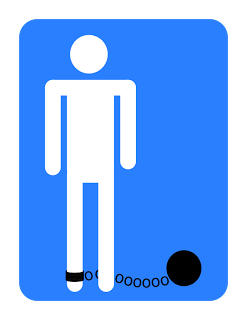
I loathe DRM.
In fact, nothing is as detrimental to the success of digital media and the people selling it as DRM and proprietary platforms that limit certain files to one type of device (e.g. iPods and Kindles).
This opinion seems counter-intuitive at first. "But DRM prevents piracy! They're gonna steal all ur stuff!" And to that I say "Bool Sheet."
People who are particularly versed at stealing aren't thwarted by DRM. There are ways around it if you're smart enough, and professional thieves have found ways to crack the code. Pirates can also easily convert your printed book into a PDF and have it online within minutes. So DRM does nothing to stop piracy. Really, all DRM does is hurt honest consumers.
It tells them you don't trust them. It tells them they're fucked if the platform for the file they downloaded from you goes tits up, or if they decide they don't much like their Kindles but want to try a Kobo or a Sony or some other e-reader, only to find that they can't take the books they bought on one device and transfer them to another.
It tells them the good money they paid you is not for ownership. It's for lease. At which point they might just decide it isn't worth paying for their content, and maybe they'll just go ahead and visit some of those nifty torrent sites. Because what's the point of paying for something if it's not going to be any good to them in a few years anyway?
This is why I don't put DRM on any of my ebooks. Sure, I sell through Amazon, and you still have to deal with their proprietary format, but it's my hope that by refusing to put that extra set of chains on my material that it will make life somewhat easier for you down the road. If it were up to me, you'd be able to buy books for your Kindle anywhere. Or you'd be able to take the ebooks you bought on Amazon and put them on any device you like. That you could treat an electronic book with every bit as much freedom and flexibility as you could a paper one. Most of the books I own, I didn't buy. They were given to me by friends. In turn, I gave them some of my favorite books, and because of their help in discovering a new author, I have gone on to purchase other books by these people. That's the beauty of how sharing both increases the pleasure of reading and encourages commerce.
It's why I also like libraries. It's why I like to give a lot of my work away.
However, if given all of my generosity in trying to do whatever I can to make my work as accessible to readers as possible I find out you're stealing from me, if I find my book on TorrentSlutz.com or some other two-bit pirating site... Well, let's just say, I will kill you and your family.

I have her on standby...
Okay, not really.
But maybe.
Don't fucking steal from me. Like ever. In fact, if you want some of my work and can't afford to buy it, contact me and I will see about emailing you a file or two. Maybe in exchange you can tell your friends about it or leave an honest review somewhere. It isn't just about the money to me. It's about acting in good faith. It's about not being a dick.
So, in short, e-books are awesome. DRM sucks. Piracy sucks the worst. And I'll kill your family if you steal from me. That's easy enough to remember, right?
Published on February 28, 2013 20:07
February 26, 2013
A Writer's Form of Stage Fright

As of this writing, the production on my novel, The Last Supper, is well under way. Its release will herald the culmination of a long-held dream of mine, to be a published novelist. But some of you might be saying, "You're already published, Allison! Why, I see you have a couple novels and a whole bunch of short stories already up on Amazon. This should be a total cakewalk!"
Sure, I've self-published, and I'm sure there will be scads of folks in the indie world ready to leap at me with all sorts of criticisms for daring to differentiate between self and traditional publishing when it comes to getting one's work out in the world these days, but I don't care what you say. It's different. Way different.
In self-publishing, you are wholly responsible for a book's success or failure. You don't have a company investing a bunch of money in the success of your book. In self-publishing, readers already have a lowered expectation of you and your material, so the bar is therefore set a tad lower. The audience is also comprised of a small segment of the reading population, and they have a more accepting mindset and understand that what they're reading will be a little less than perfect. In a way, they're kind of like the faithful groupies of those unpolished but otherwise talented rock bands who grace the local watering hole on the weekends and practice in their garages or basements after work. I love these kinds of people and I'm thankful for them every day.
Also, in self-publishing, if you don't like the way your book is doing, or if you find it has typos or a plot hole or some other bad thing the readers picked up on and mentioned in reviews, it's as simple as taking it down, fixing it, and then re-publishing it. You can't do that so easily when there are a few thousand copies of your book (or a few hundred thousand, depending on your particular book deal) already printed and being distributed to the public. And any changes you want to make to the e-book have to go through a bit more of a process.
As for the audience, the expectations are nothing short of perfection. The editing must be spot-on. And your your story had better not suck.

But those are all mostly external pressures. The internal stuff is far worse. Because inside your head, there lives an angel and a demon. The demon feeds off the blood of the good angel who was there when you first finished your book, who coaxed you through all the rough times when you didn't think you'd be able to finish, who told you how good an author you were, how great your book was, and how when this gets published, everything is going to be amazing.
Turns out the angel is also a bit of a wimp. It can't handle the altitude of heightened expectations or the borderline mania that comes with a lack of total control over the process that self-publishing gives you. The angel doesn't like interacting with others, and it certainly doesn't like hearing the hard truth. The demon has no real love for your book or you or your peace of mind, either. He just wants to wreak havoc. He wants you to tell you your book is trash and that you're destined for failure and humiliation. He wants you to think anything that angel told you was a lie.
Well, to both the angel and the demon I say: Screw You.
Neither of them are doing you any favors. The angel does nothing to prepare you for the realities of publication, and the demon is just a flat out sadist.
Yes, I'm terrified people will hate my book when it comes out. Or worse, that it won't sell and that my career will be dead in the water. I'm afraid that the investment my publisher has made in me won't pay off and that good people will suffer the consequences of having faith in me. I'm angry that I couldn't muster the same love for The Last Supper on this most recent reading that I had when I wrote it and when I edited it and edited it again before even submitting it, and that now, of all times, my eyes are refusing to see that it was the SAME book I loved before, and that the only thing that has changed is me. That I've started the inevitable detachment process that I think we all do in order to protect ourselves when the world takes our work into its hands and has its way with it.
The production process for this book is like standing behind the curtain before your play's opening night and feeling absolutely certain you're going to tank, that you're going to forget all your lines and trip and fall and they're all gonna laugh at you. But that never really happens, does it? In most cases, your body and your brain go into a sort of autopilot, and you soldier through it and prevail, despite all the nerves and absolute certainty of failure. And then, when it's all over, you wondered why in the hell you were so nervous to begin with.
That happens, because the demon, for all its destructive nature, can't handle the spotlight. It lives in the darkness. It couldn't invade the part of you that lives down deep and knows the score. It knows the lines, knows the marks, knows you're a good writer. Or at least good enough to get where you are, because that's all you need to be.
Published on February 26, 2013 10:24



